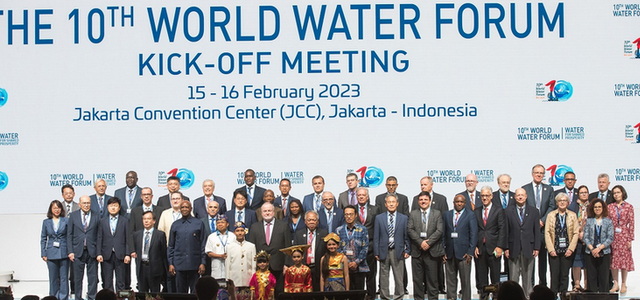Next year, in 2024, Indonesia is set to host the 10th World Water Forum (WWF). To commemorate this and start the preparations leading up to it, a kick-off meeting was held on Feb. 15-16 at the Jakarta Convention Center, Central Jakarta. With over 1,400 attendees from a variety of key individuals in the water-management field, this meeting serves as an introduction to next year's 10th WWF. Indonesia being chosen as the host of the 10th WWF is expected to be a huge collaborative opportunity in the water resource-management field and can have a positive economic impact on Indonesia. The government is currently aiming for around 17,000 participants and over 30,000 visitors from over 172 countries to the event, which will be held in Bali on May 18-24, 2024.
President of the World Water Council, Loic Fauchon, in the opening ceremony stated that the Kick-Off Meeting is a momentum to make water an important issue. As a natural resource, water is the only natural element on earth that cannot be reproduced, so it is important to maintain water sustainability.
The 10th World Water Forum will raise the theme "Water for Shared Prosperity", by looking at the current global conditions that face challenges in the availability of clean water in many countries. Indonesia is committed to strengthen the collaboration of various stakeholders in achieving SDG 6 targets, namely related to the right to clean water and sanitation.
"Let us listen to each other with humility, and speak with modesty, in the service of a common ambition, to give back hope, dignity, through the possibility of access to water, sanitation, security and prosperity for all" said Loic.
Minister of Public Works and Housing, Basuki Hadimuljono at a press conference (Feb. 15) said that the Kick-Off Meeting was an opportunity to discuss water in terms of politics. It takes cooperation and collaboration from various parties to be able to maintain the sustainability of water. "Through this Kick-off Meeting, there are at least six main issues of water resources that will be discussed through political, thematic and regional processes to find solutions, innovations and implementation," said Minister Basuki.
On the second day of the meeting, the participants were divided into 6 thematic sessions. The first is Water for Humans and Nature which discusses water management and the relation with humans and nature. This topic was moderated by Thomas Van Waeyenberge from AquaFed together with the Director of the Polytechnic Public Works of the PUPR Ministry, Indratmo Soekarno.
There was also the topic of Water Security and Prosperity which was moderated by Jin Hai from the International Economic & Technical Cooperation and Exchange Centre, together with Joni Hermana from the Institut Teknologi Sepuluh Nopember.
The third topic, Disaster Risk Reduction and Management, which discussed water management and disaster management efforts. The discussion was moderated by Budi Santoso Wignyosukarto from Gadjah Mada University together with Mikio Ishiwatari from the Japan Water Forum.
An issue of collaboration was also discussed on the topic of Cooperation and Hydro Diplomacy. The discussion was assisted by Mochamad Amron from the National Water Saving Partnership Movement (GNKPA) as moderator with Mohamed Fawzi Bedredine, Project Regional Coordinator, Senegal River Basin Organization (OMVS). Dr. Mochamad Amron also currently hold the position as the Chairman of the Global Water Partnership Indonesia). Mr. Fany Wedahuditama, Regional Coordinator for Global Water Partnership Southeast Asia, acted as the rapporteur for this topic during the closing session.
Meanwhile, the discussion on water management from a financial perspective is discussed through the fifth topic, namely Water and Innovative Finance. This discussion was moderated by Saroj Kumar Jha, Global Director, Water Global Practice, The World Bank together with Fauziah Zen from the Economic Research Institute for ASEAN and East Asia (ERIA).
The sixth topic is Knowledge and Innovation. It was moderated by Callum Clench, Executive Director of the International Water Resources Association (IWRA) together with Robert J. Kodoatie from Diponegoro University.
In addition to the thematic processes, there is also regional process that discussed the agendas of various countries and the expected results. This regional process is divided into two groups, one for Asia Pacific countries and another for the Mediterranean countries. (AW)
